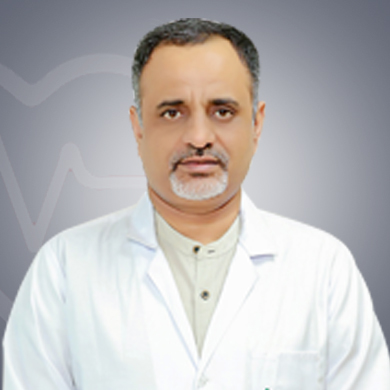
Spine & Neurosurgeon
Asian Institute of Medical Sciences , Faridabad, India22 Years of experience
Speaks: English
With 24 years of clinical experience, Dr. Kamal Verma is an expert in neurosurgery in the NCR region. Dr. Verma completed his Bachelor of Medicine and Bachelor of Surgery (MBBS) from Pt. Bhagwat Dayal Sharma Post Graduate Institute of Medical Sciences at Rohtak, Haryana. Later he completed an MS in general surgery from the same Institute. In 2002, he was awarded M.Ch. in neurosurgery by the Post Graduate Institute of Medical Sciences at Chandigarh. Currently working as Director Neurosurgery at the Asian Institute of Medical Sciences, Faridabad, Dr. Verma was also associated with Sarvodaya Hospital, Faridabad, Max Superspeciality Hospital, Saket, and Sehgal Neurological Research Institute, New Delhi.
Dr. Kamal Verma has performed many neurosurgeries including complex brain surgeries. He is an expert in performing minimally invasive surgeries. The services provided by Dr. Kamal Verma includes Endoscopic Disc Surgery, Congenital Neurosurgical Disease, Spinal Cord Injury Treatment, Brain Aneurysm Treatment, Traumatic Brain Injury (TBI) Treatment, Spinal Diseases, Minimal Invasive Spinal Surgery, Vascular Neuro-Surgery, McKinzie Treatment for Spine, Brain Tumor Surgery, Spinal and Cerebral Tumor Embolization, Percutaneous Fixation, Pediatric Neuro-Surgery, and Skull Base Surgery.
A neurosurgeon is a medical specialist who diagnoses and treats conditions affecting the nervous system, including the brain, peripheral nerves, spinal cord, and spine. Neurosurgeons offer non-operative as well as surgical treatment to patients. Here is a list of some of the conditions Dr. Kamal Verma treats:
Neurological conditions produce different symptoms ranging from mild to severe. You should never ignore any such symptoms because these may lead to severe results if left unaddressed. Some of the signs and symptoms that neurological disorders can produce are listed below.
The above symptoms appear mainly due to conditions that can adversely affect the nervous system. The symptoms can vary from person to person because the nervous system regulates different body functions. Symptoms can include all forms of pain.
The working hour of doctor Kamal Verma is 11 am to 5 pm from Monday to Saturday. The doctor has an off on Sunday. Call the doctor or his attendant to confirm his/her availability because the doctor may not be available due to some personal reasons or any emergencies.
The popular procedures that Dr. Kamal Verma performs are listed below:
Dr. Kamal Verma specializes in the surgical treatment of neurological disorders and has operated on a large number of diseases. The neurosurgeon has developed an excellent team of physicians to handle even the most complex cases with minimal invasion and the highest safety. The team includes neurosurgeons and neuroradiologists who are regional experts in the surgical treatment of neurological diseases.

Share Your Experience about Dr. Kamal Verma

Neurosurgeons provide surgical treatment for the conditions of the brain and spine. They are considered some of the highly experienced and trained specialists in medicine and are involved in consulting with other doctors about various cases. Neurosurgeons treat people with a range of neurological issues, such as lower back pain, brain tumor, carpal tunnel syndrome, and peripheral nervous system disorders. Neurosurgeons work both in private and public hospitals. They also see patients in a clinic or surgery. They work closely with specialists and health professionals as part of a medical team, such as a critical care team or a hospital stroke team.
You may have one or more diagnostic tests so that doctors can know the cause of your condition and make effective treatment strategies. A neurological examination may include the following:
Below are some tests that a neurosurgeon may recommend for the diagnosis of the conditions of the nervous system.:
If you show the below symptoms, consult a neurosurgeon who will diagnose the condition and suggest the right treatment.
Neurosurgeons perform complicated operations on the brain. Also, they deal with the whole nervous system and treat all the body parts that are affected by nerve issues. Typically, a neurosurgeon will diagnose patients' symptoms and come up with minimally invasive treatment plans.